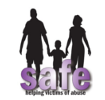Stalking is a pattern of repeated and unwanted attention, harassment, contact or any other course of conduct directed at a specific person that would cause a reasonable person to feel fear. Stalking is a dangerous crime that affects an estimated 6.6 million women and men each year. Stalking is a crime in all 50 states, the District of Columbia, the U.S. territories and the federal government. As many as 1 in 4 women and 1 in 13 men have experienced stalking victimization at some point during their lifetime and most often the stalker is someone the victim knows: an acquaintance, a relative, or a current or former intimate partner.
Stalking can include:
- Repeated, unwanted, intrusive, and frightening communications from the perpetrator by phone, mail, and/or email.
- Repeatedly leaving or sending victim unwanted items, presents, or flowers.
- Following or laying in wait for the victim at places such as home, school, work, or recreation place.
- Making direct or indirect threats to harm the victim, the victim’s children, relatives, friends, or pets.
- Damaging or threatening to damage the victim’s property.
- Harassing victim through the internet.
- Posting information or spreading rumors about the victim on the internet, in a public place, or by word of mouth.
- Obtaining personal information about the victim by accessing public records, using internet search services, hiring private investigators, going through the victim’s garbage, following the victim, contacting victim’s friends, family work, or neighbors, etc.
Stalking is unpredictable and dangerous. No two stalking situations are alike. There are no guarantees that what works for one person will work for another, yet victims can take steps to increase their safety.
What To Do If You Are Being Stalked
- Trust your instincts. Victims of stalking often feel pressured by friends or family to downplay the stalker’s behavior, but stalking poses a real threat of harm. Your safety is paramount.
- Call the police if you feel you are in immediate danger. Explain why even some actions that seem harmless – like leaving you a gift – are causing you fear.
- Keep a record, journal, or log of each contact with the stalker. Be sure to document any police reports.
- Stalkers often use technology to contact their victims. Save all emails, text messages, photos and postings on social networking sites as evidence of stalking behavior.
- Call SAFE to talk through your options and discuss safety planning.
SAFE provides services for victims of stalking. Please call our crisis line (910.893.7233) for more information and support.
Adapted from the Stalking Resource Center

